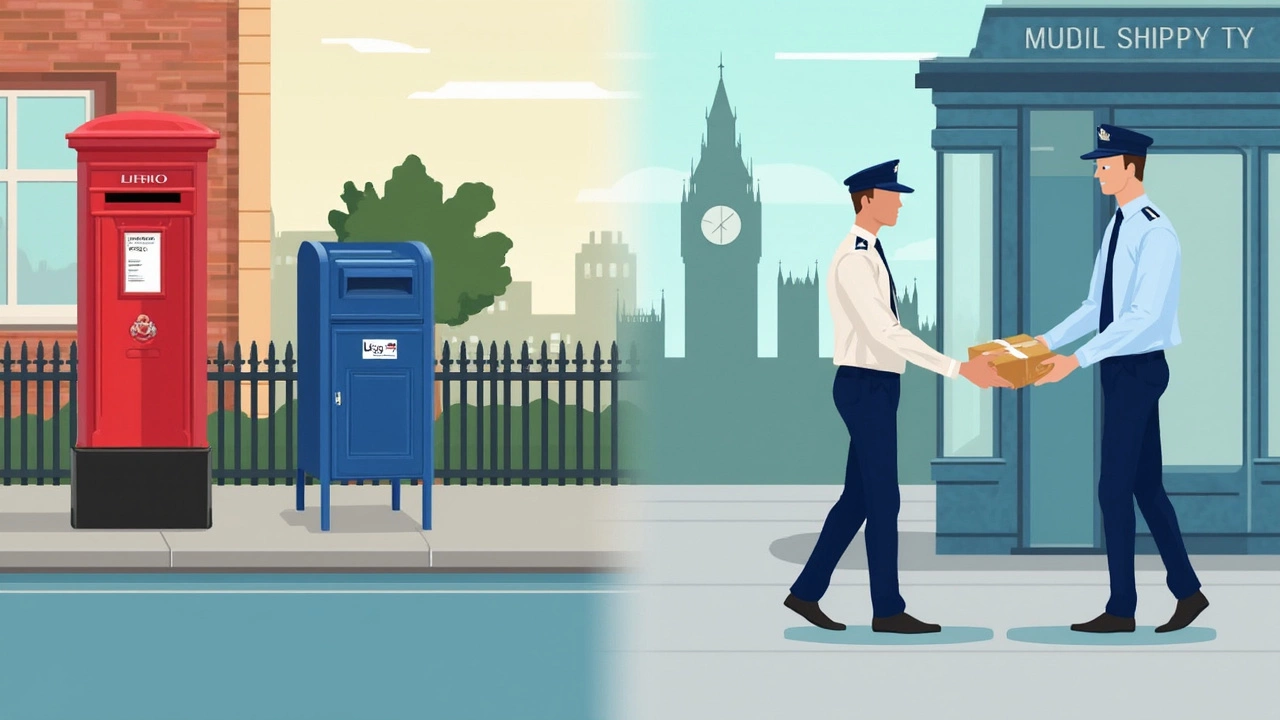Ever asked yourself if USPS is actually a courier or just the regular mail? You’re not alone, and the answer might actually change how you send that next important package.
The word “courier” gets tossed around a lot, but not everyone uses it the same way. Some people think courier means a guy on a bike, racing across town with top secret documents. Others think it’s anyone who’ll get your stuff from point A to point B, fast. But the truth isn’t that simple—especially when the U.S. Postal Service is involved.
So, before you choose a shipping option, it’s important to know how USPS compares. It’s easy to assume all delivery companies work the same, but there are key differences you’ll notice once you actually ship something. Knowing who counts as a courier could make a difference in how your package gets treated—things like speed, insurance, or who you call if something goes missing. And yes, sometimes even your cat might have an easier time tracking a lost package than you would without the right info.
- Breaking Down What a Courier Really Is
- How USPS Operates (and Where It Fits)
- Key Differences Between USPS and Private Couriers
- Tips for Choosing the Best Service for Your Needs
Breaking Down What a Courier Really Is
Let’s clear up the basics—what do people really mean by “courier”? At its core, a courier is a company or person who delivers parcels, documents, or goods by hand, and usually offers much faster, more secure, or more trackable service than regular mail. You’re probably thinking about companies like FedEx, UPS, or DHL. These companies give you real-time tracking, have proof-of-delivery options, and often promise delivery within a certain number of hours or days.
Courier services tend to stand out because they:
- Offer door-to-door pickups and deliveries.
- Let you track your parcel every step of the way.
- Specialize in express or time-sensitive shipments.
- Handle sensitive, valuable, or urgent goods—sometimes medical samples, legal papers, or even live animals (not kidding, I checked; no, Whiskers hasn’t tried it).
But wait, this isn’t just a US thing. Couriers exist worldwide. In many big cities, bike couriers zip through traffic with everything from sushi orders to legal docs. Big international couriers move stuff across borders, handling all that paperwork you’d rather not touch.
| Feature | Courier Service | Regular Postal Service |
|---|---|---|
| Door-to-door pickups | Usually | Rarely |
| Real-time tracking | Standard | Sometimes |
| Delivery speed | Same day/Next day | Varies—can be slow |
| Proof of delivery | Always | Depends |
| Handle urgent parcels | Yes | Not always |
Here’s the twist: Not everyone agrees on the exact definition. Some countries treat their government mail services as couriers because they offer express and tracked options—others just see them as “the post.” That’s where the debate around the USPS kicks off. Is it a basic postal service? Or does it fit into the courier game too? Hang tight—we’ll dig into that next.
How USPS Operates (and Where It Fits)
The United States Postal Service, or USPS, is basically the government’s official mail delivery system. It was created back in 1775—yes, even before the American Revolution was finished. Unlike private couriers, USPS has to serve every address in the country, even the tiniest cabins in Alaska or remote cactus ranches in Arizona. This means, by law, your mail carrier has to get your letter or package to you, no matter where you live.
USPS handles everything from letters and postcards to big packages and certified documents. It offers a bunch of different shipping options, like First-Class Mail (good for everyday letters), Priority Mail (faster and with tracking included), and Priority Mail Express (overnight delivery for when you’re in a real hurry). You can even ship international and military mail through USPS, which is pretty handy if you’ve got family abroad or in the service.
The coolest part? USPS is the only group legally allowed to deliver to your actual mailbox. FedEx and UPS can leave stuff on your porch, but only USPS has the keys to your mailbox. That’s a big reason why they’re so important, especially for official stuff like voting ballots and government checks.
Now, USPS works more like a massive logistics web than the door-to-door service you get from private couriers. Mail from one city gets sorted with millions of other pieces at regional hubs, then bounces through trucks, planes, and more sorting before landing on your doorstep. It’s super-efficient for everyday shipping—but not always the quickest or the most customizable. If you want next-level tracking or need a guaranteed delivery time down to the hour, that's where private courier services pull ahead.
But for sending things affordably to anywhere in the U.S., nothing beats the reach and scale of USPS. They’ve even got special deals for small businesses, and their flat-rate boxes can sometimes save a ton compared to couriers who charge by size or weight.

Key Differences Between USPS and Private Couriers
Alright, let’s make this clear. USPS and private couriers like FedEx, UPS, or DHL don’t exactly do the same job, even though both will deliver your packages. The differences show up in everything from who owns them to how they handle your package when it’s in transit.
USPS is government-run. It’s the official postal service in the U.S., funded partly by postage and partly by Congress. Private couriers, on the other hand, are businesses all about making a profit. This changes what they can offer you and how they run their operations.
Here’s how it breaks down:
- Speed: Private couriers often guarantee overnight or two-day shipping across the country. USPS has fast options (like Priority Mail Express), but USPS regular mail can take longer, especially during holidays.
- Tracking: Private couriers usually give you more detailed tracking, like a minute-by-minute play of your package. USPS offers tracking, but it’s not always as detailed; sometimes it only shows when something leaves or arrives at a major stop.
- Insurance and Claims: USPS includes some insurance with Priority Mail and up. Filing a claim can be a headache. Private couriers are famous for easier claims and better handling of high-value items. Many e-commerce shops choose private couriers for that peace of mind alone.
- International Service: Private couriers have offices all over the world, in big cities and smaller places. While USPS can ship worldwide (by teaming up with local post offices), their last-mile delivery abroad depends on other countries’ postal systems, and sometimes tracking simply stops at the border.
- Delivery Guarantee: Private couriers often provide money-back guarantees if a package isn’t delivered on time. USPS does this only for certain express services.
- Pricing: USPS is usually cheaper for light or small packages and regular mail. Private couriers get pricey if you’re sending heavy stuff or want extra-fast shipping.
Check out this quick comparison to see some specifics:
| Feature | USPS | Private Couriers (FedEx/UPS/DHL) |
|---|---|---|
| Ownership | Government | Private Company |
| Delivery Speed | Varies (1-5 days domestic) | Next-day or 2-day standard |
| Tracking Details | Standard (milestone-based) | Detailed (includes every hand-off) |
| Insurance | Limited; extra available | More comprehensive |
| International Reach | Via local partners | Direct network/global offices |
| Pricing | Lower for small items | Can be higher, esp. for fast delivery |
So, which should you use? If you’re sending a birthday card, USPS is fine and costs less. If you’re shipping a laptop or need same-day delivery, private couriers give you more control. A lot depends on your priorities—speed, cost, tracking, or just getting it there in one piece.
Tips for Choosing the Best Service for Your Needs
Picking the right shipping service is more about your specific situation than anything else. If you just need to mail a birthday card to Grandma or send out tax forms, USPS usually does the job. But not every delivery problem is so simple. Here’s what to keep in mind when you’re choosing between USPS and private couriers.
- Speed: USPS Priority Mail generally delivers in 1-3 business days for domestic packages, which is pretty solid. If you need overnight delivery or weekend delivery, services like FedEx or UPS might win out. Most USPS offices don’t offer true same-day delivery.
- Tracking: USPS tracking is better than it used to be, but private couriers like UPS and FedEx let you see your package’s journey in more detail. This matters when you want to know exactly where your stuff is, every step of the way.
- Package Type: If you’re sending sensitive paperwork, artwork, or high-value tech, check for features like strict chain-of-custody, insurance, or signature on delivery. Private couriers usually make these a breeze, while with USPS you sometimes have to pay extra.
- International Shipping: USPS partners with foreign postal services, which works nicely for basic international mail. But if you need tight timelines or robust tracking for overseas packages, FedEx and DHL generally do better.
- Budget: USPS is often cheaper for lighter packages or anything mail-sized. Once you start shipping heavier stuff (think 5 pounds and up), private couriers can have more competitive rates—especially for time-sensitive shipments.
- Pick-Up & Drop-Off: Private couriers let you schedule home pickups online, even if your package weighs as much as a small dog (I’m looking at you, Whiskers). USPS offers pickups too, but it’s not always as smooth or flexible—especially if you’re in a hurry.
To make this easier, check out this simple cheat sheet comparing key features:
| Service | Fastest Delivery Option | Standard Tracking | Insurance Included | Typical Cost (small package) |
|---|---|---|---|---|
| USPS | Priority Mail Express (overnight for most zip codes) | Yes, but sometimes less detailed | Up to $100 | $8–$28 |
| FedEx | SameDay or Overnight | Very detailed, real-time | Up to $100 | $15–$40 |
| UPS | Next Day Air | Very detailed, real-time | Up to $100 | $15–$45 |
Here’s a tip most folks don’t know: Sometimes it’s actually faster and cheaper to use USPS for super light stuff—like documents or greeting cards—especially if you’re not in a massive rush. But for anything you can’t risk losing—like a passport or expensive tech—spring for a private courier. They’ll treat it like gold, and the stronger tracking keeps stress low.





